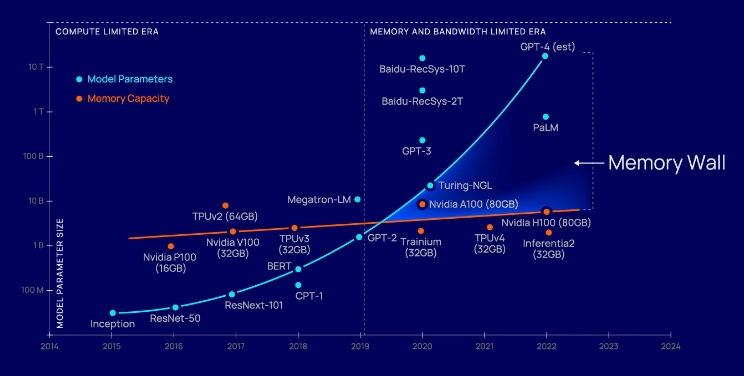![]()
An artist’s view of the Photonic Fabric. [Image: Celestial AI video]
Celestial AI, a company working on a proprietary optical-interconnect technology platform dubbed the Photonic Fabric, announced on 27 March that it had completed a new US$175 million Series C funding round that the firm’s founder and CEO, Dave Lazovsky, called “highly oversubscribed.” In a separate announcement in sync with last week’s 2024 OFC conference in San Diego, CA, USA, Celestial AI noted that a number of data center hyperscaler and semiconductor customers are now working with the firm to design Photonic Fabric chiplets as “an initial phase of technology adoption.”
Optical data for the “point of compute”
As Lazovsky explained to OPN in an interview last August, the Photonic Fabric is an interconnect scheme designed to move optically encoded data to the precise point of computation within the electronic GPU or application-specific integrated circuit (ASIC). That architecture, he said, keeps data in the more efficient optical domain for as long as possible before its conversion to the electrical domain for actual processing.
In his talk with OPN, Lazovsky distinguished the point-of-compute Photonic Fabric architecture from the so-called beachfront architecture of most optical-interconnect approaches. In that architecture, optical-to-electrical conversion occurs at the outside boundaries of the GPU or ASIC rather than the point in the chip where computation actually takes place. The Photonic Fabric, by contrast, uses a proprietary, thermally stable modulation technology and other tricks to enable bandwidth delivery “beyond the beachfront” and directly to the point of compute within the chip, Lazovsky told OPN.
Celestial AI argues that the computation industry is moving from a “compute-limited era” to a “bandwidth-limited era” owing to a “memory wall”—a mismatch between the slow growth of on-chip memory capabilities and the dramatic expansion of data requirements for advanced AI. [Image: Celestial AI]
Moving the data as close as possible to the point of compute, Celestial AI argues, is essential to overcoming a hurdle increasingly encountered by bandwidth-hungry advanced AI workloads. The data requirements of those workloads have increased exponentially in recent years, while available on-chip memory of even for the most advanced chips has gained at a much slower rate. In extreme cases, the resulting “memory wall” can create large amounts of “stranded memory,” a situation that in turn can degrade efficiency and torpedo AI performance.
A focus on large hyperscalers
By allowing “the disaggregation of compute and memory,” Celestial AI says, the Photonic Fabric can enable a significant performance kick. The company maintains, for example, that integrating Photonic Fabric technology could bring as much as a 25-fold boost in off-package bandwidth relative to “other state-of-the-art technologies.” And it says the Photonic Fabric can reduce latency and power consumption by 10 times compared with “existing optical interconnect alternatives and copper.”
In its recent set of announcements, Celestial AI said it’s now working directly with “some of the largest hyperscalers” to study the data–memory chokepoints they’re facing and to develop “Photonic Fabric solutions.” The company noted in its release that these solutions require “no software changes” and can fit into existing workflows.
In its recent set of announcements, Celestial AI said it’s now working directly with “some of the largest hyperscalers” to study the data–memory chokepoints they’re facing.
In the release, Lazovsky said the company was “experiencing broad customer adoption” of its technology and pointed to “deep strategic collaboration with hyperscale data center customers” that he called “the giants of our industry.” He also cited partnerships with companies in the custom semiconductor and ASIC design, integration and packaging space, such as Broadcom and Samsung, as Celestial AI works to build a “Photonic Fabric ecosystem.”
New funds for growth
The separately announced US$175 million Series C funding round for Celestial AI was led by the US Innovative Technology Fund (USIT)—a vehicle that “invests in critical technology companies with dual-use applications for the commercial sector and the defense industry”—and included participation by around a dozen other new and existing investors in the company. Funds from the new round, Celestial AI said, will enable the firm “to execute multiple large-scale customer collaborations focused on commercializing its breakthrough Photonic Fabric technology platform.”
In a press release announcing the funding, Thomas Tull, USIT’s chairman, called Celestial AI’s “sophisticated work” on connectivity “critical to addressing key concerns across performance and energy efficiency.” Such progress, Tull said, is needed to ensure that the nascent AI industry “has the necessary infrastructure to continue to innovate and scale.”

